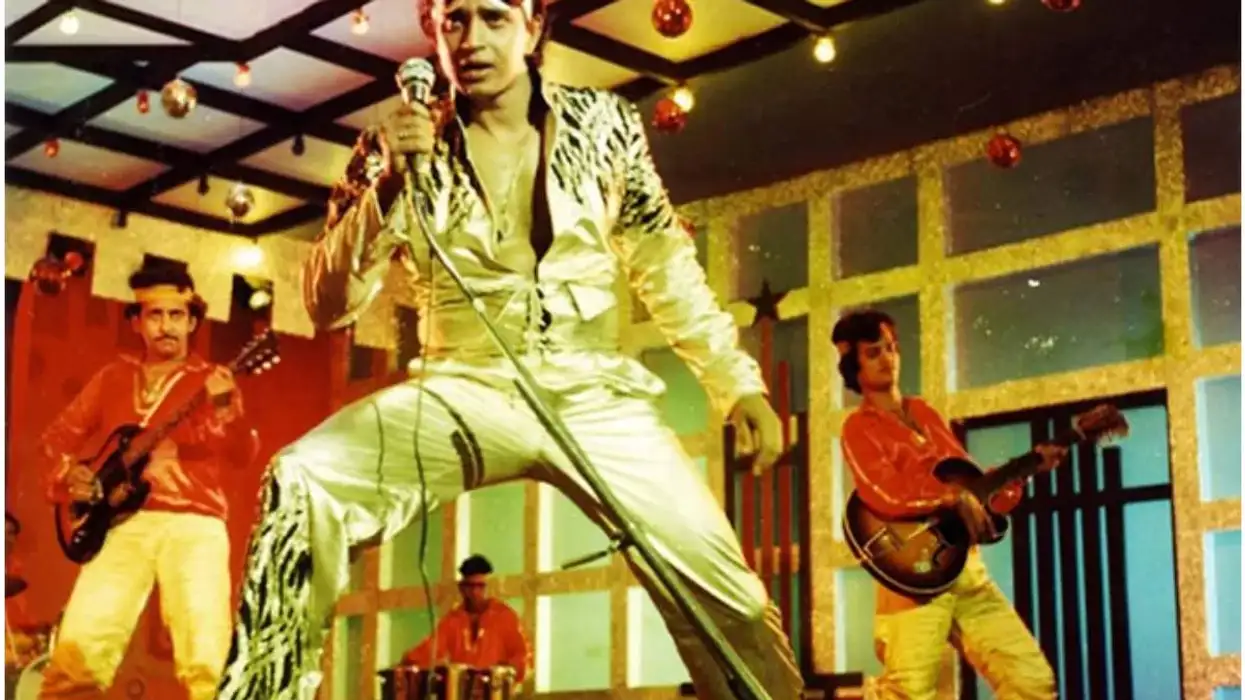Bollywood movie Disco Dancer was a big blockbuster success when it released in 1982 and has become a cult classic largely thanks to the winning soundtrack.
The story of a slum dweller dreaming of a better life for himself and hoping to dance his way to success while battling dark forces connected with multi-cultural audiences globally.
A theatre musical version of the movie will be staged at Sadler’s Wells Theatre in London from November 16 – November 20, which has the sparkly suited soul of the original, along with the songs reimagined by Salim-Sulaiman.
Eastern Eye decided to get you a step close to the film ahead of the UK theatre premiere of Disco Dancer, with 21 quick facts connected to the classic.
- Sanjeev Kumar was originally supposed to make a cameo, but he was replaced by Rajesh Khanna, who shot for three days.
- Relative newcomer Kim was cast after several high-profile leading ladies had refused the film.
- A young Jaaved Jaaferi refused to be part of the film because he was asked to dance inferior to main lead Mithun Chakraborty. The role was given to Karan Razdan instead.
- The introduction music of hit single The Love Stealerz by Saint Tropez inspired the opening of I Am A Disco Dancer song.
- Vijay Benedict made a winning debut singing the Disco Dancer title track. He would largely sing for lead star Mithun in his subsequent movies in the 1980s.
- The movie’s song Jimmy Jimmy Jimmy Aaja sampled music from 1980 song T’es Ok T’es Bath by French pop duo Ottawan.
- British Sri Lankan rapper M.I.A did a stunning cover version of Jimmy Jimmy Jimmy Aaja in 2007 for her album Kala. That version was used in Hollywood film You Don’t Mess with the Zohan (2008).
- There have been cover versions of Jimmy Jimmy Jimmy Aaja by Russian techno group Ruki Vverh! and another by Tibetan artist Kelsang Metok.
- 1980 single Jesus by Dutch-Indonesian band Tielman Brothers inspired Disco Dancer spiritual song Krishna Dharti Pe Aaja Tu.
- Kishore Kumar was originally supposed to sing the song Yaad Aa Raha Hai but couldn’t record on the day owing to ill health. Composer Bappi Lahiri then recorded it in his voice, and everyone agreed that version should be used.
- There is a music sample of Video Killed The Radio Star by The Buggles in the song Koi Yahaan Nache Nache.
- It may have only been the seventh most successful Bollywood film of 1982 in India, but that all changed two years later when Disco Dancer released in the Soviet Union and smashed records. That success turned it into one of the highest grossing Indian movies in history.
- Lead star Mithun became hugely famous in China and across Africa thanks to the success of Disco Dancer, and its soundtrack. He also remains an icon in former Soviet countries such as Kazakhstan.
- Disco Dancer releasing a couple of weeks after iconic album Thriller led to comparisons in India between Mithun and Michael Jackson.
- Disco Dancer was remade in Telugu as Disco King (1984) and in Tamil as Paadum Vaanampadi (1985).
- Disco Dancer spawned the less successful spiritual sequel Dance Dance (1987). Producer-director B Subhash also planned Super Dancer but that was not made.
- Mithun played Jimmy in Disco Dancer and would get that nickname from international fans. In 2008, his son Mimoh Chakraborty made his acting debut in a film titled Jimmy.
- Mithun performed the song Disco Dancer in Golmaal 3 (2010). The hit comedy also features the film’s song Yaad Aa Raha Tera Pyar.
- Aamir Khan’s Disco Fighter look in Delhi Belly (2011) was very much inspired by Disco Dancer.
- A cover version of I Am A Disco Dancer sung by Benny Dayal, featuring Tiger Shroff in the music video, has been viewed more than 130 million times on YouTube.
- A book satirising the film’s screenplay, titled Disco Dancer – A Comedy In Five Acts, was written by Anuvab Pal.
Saregama Live Disco Dancer is being staged at Sadler’s Wells Theatre, Rosebery Avenee, London EC1R 4TN from Wednesday November 16 – Sunday November 20. www.sadlerswells.com




